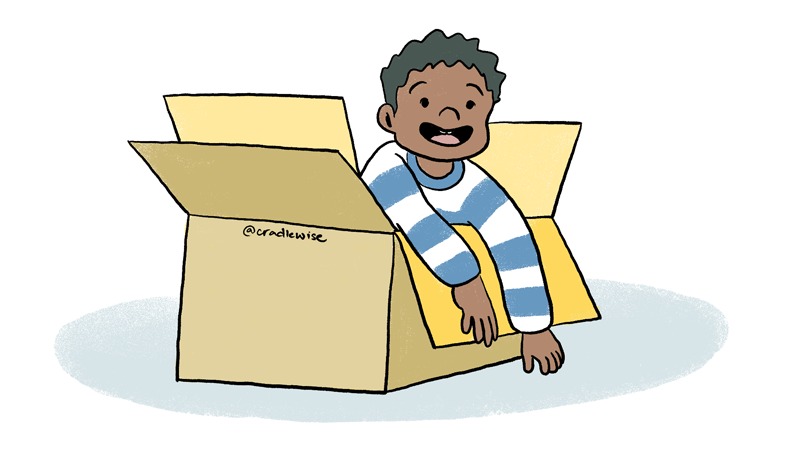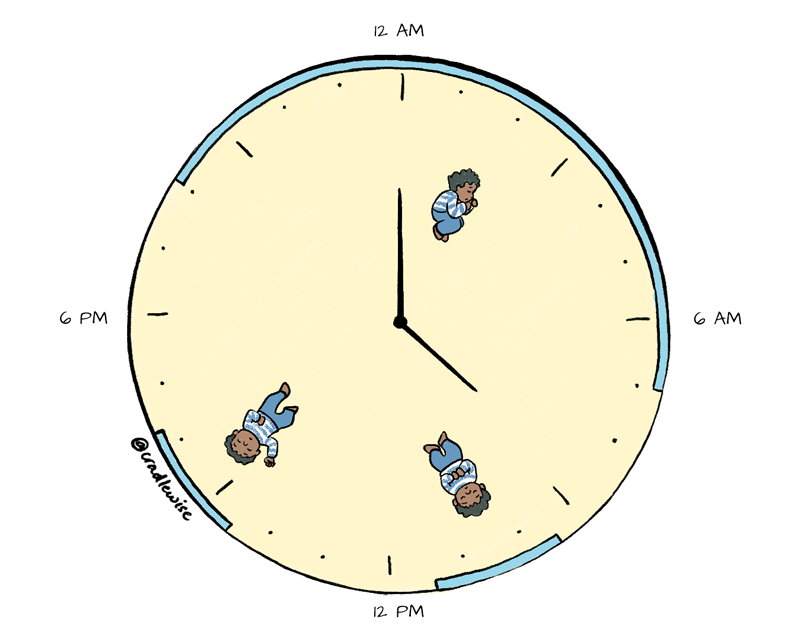Science of baby sleep
0 min read
12-month-old baby sleep guide

Cradlewise Staff
Night sleep
Daytime naps
Total sleep
10-12 hours
1-2 hours
11-14 hours

Night sleep
10-12 hours

Daytime naps
1-2 hours

Total sleep
11-14 hours
At 12 months old, your little one is officially moving from being classified as an infant to a toddler. As you can probably guess, the term “toddler” generally refers to a child that is now “toddling” or walking, but not all 1-year-old toddlers will be fully walking at 12 months old—and that’s okay!
Every baby is different and every toddler is different. However, as your little one grows and officially leaves their babyhood behind forever (sob), there are some things you can prepare for, especially when it comes to sleep. Here’s more about what to expect from your brand-new toddler in terms of development, sleep milestones, nutrition, and more.
12-month-old baby milestones for sleep
Two specific things happen around your baby’s first birthday:
1) their sleep needs decrease slightly, and 2) they may experience a 12 month sleep regression.
Decreased sleep needs in 1-year-olds
While your child’s sleep needs decrease at this age, keep in mind that it’s only a slight decrease, from around 15 hours total per day to a recommended 14 hours of sleep per 24 hours, according to the Centers for Disease Control and Prevention (CDC).
Some toddlers may even need as little as 11 hours of sleep per 24 hours, although in general, when it comes to growing minds and bodies, more sleep is always important.
Even if your toddler resists naps, some quiet time or downtime in the afternoon is beneficial for everyone. Make a habit of settling your toddler in with a book or other quiet activity at regular nap times as part of their daily routine.
12-month sleep regression
Not all 1-year-olds will experience a 12-month sleep regression, but some toddlers may experience a setback in their sleep.
You might notice a 12-month-old sleep regression if your toddler suddenly resists naps or bedtime, won’t fall asleep, or seems too wired to settle down for sleep. Like other sleep regressions, the 12-month-old sleep regression is tied to a leap in your child’s development.
Any time your baby experiences a burst of physical growth and brain development, these changes can impact and potentially disrupt their sleep patterns.
1-year-old milestones include all sorts of exciting things like walking, new words, and plenty of discoveries about the world around them—and all that new development can make settling down to sleep a lot more challenging.
The Sleep Foundation notes that in addition to physical growth and brain development, some other things that may disrupt your 12-month-old’s sleep include:
- Teething
- Overstimulation
- New schedules or routines
- Sleep training
- Separation anxiety
- The onset of nightmares
What’s going on in your baby’s brain?

The toddler stage from 1 to 2 years old is all about developing and learning independence.
That means that you might have a long year ahead of chasing after your child, who seems determined to spend every possible moment adventuring, discovering, testing, and exploring. Fortunately, all that exploration is necessary for their growth and development, but unfortunately for parents, overseeing it all can be a lot of work.
Help yourself out a bit by creating safe places for play, babyproofing your home, and providing plenty of parent-approved experiences for exploration.
While you can certainly invest in developmental toys for your 1-year-old, some of the best toys for a toddler are the most simple: anything they can climb on, open, touch, and move around, for example. Your Amazon boxes? Perfect to sit in. Your kitchen drawers? So much fun to open and empty! The couch cushions? The best climbing gym!
The Centers for Disease Control and Prevention (CDC) also recommends that parents of toddlers take additional safety steps as their little ones practice all that growth and development:
- Always supervise your toddler around water.
- Make sure stairs are blocked off.
- Turn pot handles away from the edge of the stove to avoid little hands pulling hot pans down.
- Take special care when you’re unloading the dishwasher to never turn your back on sharp objects with your toddler around (they will find the knife).
- Keep any guns locked up and stored away from ammunition.
- Continue to keep your toddler rear-facing in their car seat.
How much should a 12-month-old sleep?

Wondering how much a 12-month-old baby should sleep? Here’s a quick look with recommendations from the CDC:
- Total hours of sleep: 11 to 14 hours
- Wake windows: 3.5 to 4 hours
- Number of naps: 2
Sample 12-month-old sleep schedule
A sleep schedule for a 1-year-old toddler should still include two naps per day and ideally, 10-12 hours of sleep at night. The one thing that does change from last month is that your toddler’s wake windows (the time they should be awake between naps) do extend to as long as 4 hours for some children. Ideally, the longer wake window will be in the afternoon, so the longest stretch your baby will be awake is between the second nap and bedtime.
While you can extend your 1-year-old’s wake windows, it is important to pay attention to your own child’s cues. Some children may not be ready for a full 4-hour wake window and even if they are, there can certainly be days when they need more sleep than others.


12-month-old feeding tips
At one year old, your toddler can officially transition to cow’s milk if you would like them to. Before 12 months old, babies can’t properly digest cow’s milk and they need the nutrients that breast milk and formula provide. As they move through toddlerhood, however, they will transition to getting the bulk of their calories and nutrients from solid food.
If you’re nursing, you can continue to feed your baby on demand. There is no set time you have to continue breast or chestfeeding, and the World Health Organization recommends nursing for as long as mutually desired by both parent and child.
- How much should a 12-month-old eat? The AAP explains that toddlers need about 1,000 calories per day, with half of those calories coming from fat.
- How much should a 12-month-old weigh? The average 12-month-old weighs between 17 and 27 pounds, according to data from the World Health Organization.
- How often should a 12-month-old eat? According to the AAP, toddlers usually eat erratically and their calories won’t always be spread out through the day like an adult’s. That means that your toddler may eat all their calories at once during breakfast, then not each much the rest of the day, or alternate days of eating more and less. All normal toddler behavior!
- Tip: Fat is crucial to your baby’s health and brain development at this age. In fact, half of your toddler’s daily 1,000 calories should come from fat, so encourage lots of healthy fats, such as whole milk, full-fat yogurt and cheese, lean proteins cooked in butter, and avocado.
- Tip: The AAP recommends 1-year-olds have 4 cups of beverages per day, including water and whole milk.
How to help support your baby’s sleep during the 12th month

During your baby’s 12th month, it can be helpful to keep the following sleep tips in mind:
Don’t move your baby to a new sleep schedule too quickly.
Don’t move your baby to a new sleep schedule too quickly.
While the 12-month-old stage might mark the moment your child moves from baby to toddler, there isn’t a magical instant that your baby’s sleep needs and schedule will instantly shift. So there’s no harm in taking things slow and letting your baby lead the way. If you do introduce a new schedule, you can slowly shift wake and nap times in small increments, such as 10 minutes at a time.
Check your baby’s sleep environment.
Check your baby’s sleep environment.
If your baby is having trouble sleeping, it might be helpful to do a quick assessment of your baby’s sleep environment. As they get older, they may get more sensitive to the conditions they need to fall asleep. (Don’t we all?) Make sure your baby has a comfortable sleeping environment that adheres to the American Academy of Pediatrics (AAP) safe sleeping guidelines: a new crib (it’s not recommended to buy used because of updated safety regulations), nothing in the sleeping area including blankets or pillows, a baby monitor securely out of reach, a cool temperature, and something to darken the room. Also helpful? A fan or white noise machine. Technically, the AAP’s guidelines don’t recommend blankets or pillows for the first 12 months, but after that, they recommend you talk to your baby’s own pediatrician about what’s safest for your baby if you want to introduce a blanket.
Consider moving your baby to their own room, if you haven’t already.
Consider moving your baby to their own room, if you haven’t already.
The AAP recommends that parents room-share with their baby ideally for the first year of life. That means that at 12 months old, you can consider moving your baby to their own room if you haven’t done so already. Some parents find that both they and their baby will sleep better with a little distance between them.
What about a toddler bed?
What about a toddler bed?
Technically speaking, your 12-month-old is now a toddler, so you may wonder if your 1-year-old can sleep in a toddler bed. The AAP’s safe sleep guidelines technically recommend a crib for the first 12 months of life, but there isn’t really a set timeframe to switch to a toddler bed. If you are considering switching your toddler to a toddler bed, be sure to talk to your pediatrician first and ensure all other safety precautions are in place, such as a safety gate around stairs and locked doors leading outside.
More posts you might like:
- 13- to 15-month-old baby sleep guide
- 16- to 18-month-old baby sleep guide
- 19- to 21-month-old toddler sleep guide
- 22- to 24-month-old toddler sleep guide
- 12 photos to take during baby’s first year
Sources:
- Important milestones: Your baby by 12 months. 2022. Centers for Disease Control and Prevention. Important Milestones: Your Baby By One Year.
- Feeding milestones. n.d. Stanford Health. Feeding Guide for the First Year.
- Growth charts. 2022. World Health Organization. WHO Growth Standards Are Recommended for Use in the U.S. for Infants and Children 0 to 2 Years of Age.
- Feeding your one-year-old. 2022. Centers for Disease Control and Prevention. Feeding & Nutriont Tips: Your 1-Year-Old.
- Feeding serving sizes. 2022. American Academy of Pediatrics. Serving Sizes for Toddlers.
- Sleep recommendations for infants and toddlers. 2023. Centers for Disease Control and Prevention. . How Much Sleep Do I Need?
- Breastfeeding recommendations. 2022. Centers for Disease Control and Prevention. Facts: Breastfeeding.
- Safe sleep guidelines. 2022. American Academy of Pediatrics. Safe Sleep.
- Toddler beverage recommendations. 2021. HealthyChildren.org. Choose Water for Healthy Hydration.
- Toddler development. 2021. Centers for Disease Control and Prevention. Toddler (1-2 years old).
- Sleep regression. 2022. The National Sleep Foundation. 12-Month Infant Sleep Regression.
You may also like



